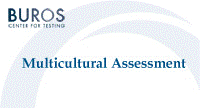Buros-Nebraska Series on Measurement and Testing

Multicultural Assessment in Counseling and Clinical Psychology
Date of this Version
Spring 1996
Document Type
Book Chapter
Citation
Published in Multicultural Assessment in Counseling and Clinical Psychology, edited by Gargi Roysircar Sadowsky and James C. Impara (Lincoln, NE: Buros Institute of Mental Measurements, University of Nebraska–Lincoln, 1996).
Abstract
Counseling professionals in the United States (U.S.) realize that they live in a multicultural, multietlmic, and diverse socioeconomic society. The complexity of this society challenges the cOlU1selor ("counselor" is used to include all psychological service providers) to revise and relearn the help-giving process. This challenge has been taken up by multicultural training (MCT). MCT's challenge is professional, philosophical, and political in nature.
Professional mandates of the American Association for Counseling and Development (AACD, 1988) (now called American Counseling Association [ACA]) and the American Psychological Association (APA) (APA, 1992; APA Office of Ethnic Minority Affairs, 1993) that influence lU1iversity accreditation and provide professional ethics are one reason for including MCT in master's and doctoral training.
There is another motivation for MCT that is less pragmatic and more implicit than professional guidelines. It is the philosophical ideology of wanting respect for differences of cultural groups and of envisioning multiculturalism as a peaceful process to co-existence in the 21st century. The third motivation has led to a political or advocacy mission that redresses the conditions of under-representation, racism, and inequity in U.S. institutions.
MCT is being increasingly provided via either university course work or topic-focused continuing education workshops. Consequently, there is a need to evaluate MCT (D'Andrea, Daniels, & Heck, 1991; Ponterotto et al., Chapter 7 this volume; Pope-Davis, Chapter 9 this volume; Ridley, Mendoza, & Kanitz, 1994; Sodowsky & Taffe, 1991). The Multicultural Counseling Inventory (MCI) (Sodowsky, Taffe, Gutkin, & Wise, 1994a), a self-report measure, was developed for two purposes: to offer philosophical support to MCT and to present a robust instrument to measure multicultural counseling competencies, an expected outcome of MCT.


Comments
Copyright © 1996 by Buros Institute of Mental Measurements. Digital edition copyright © 2012 Buros Center for Testing.